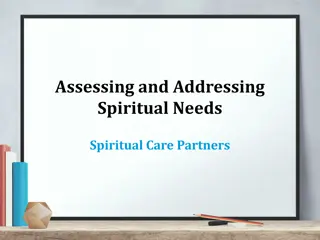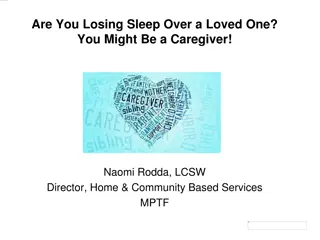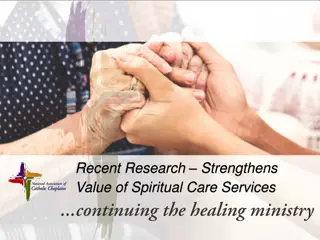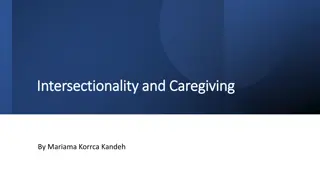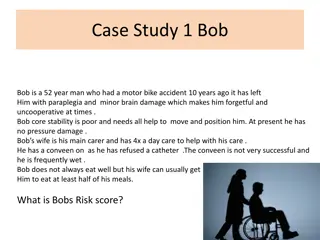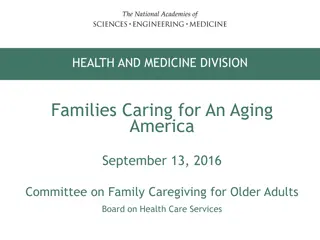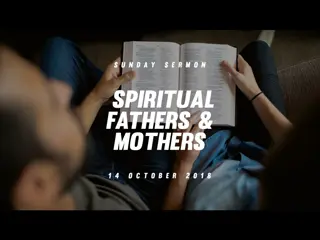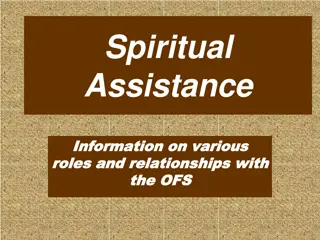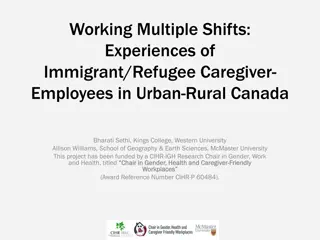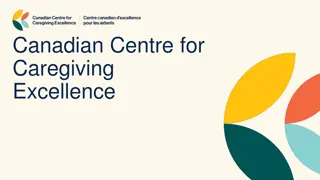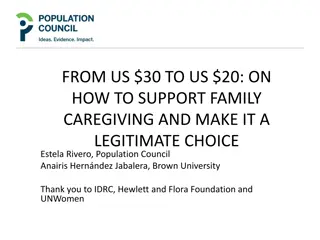Spiritual Caregiving: Tips and Strategies for Effective Support
Understanding the essence of spiritual/pastoral caregiving, which stems from the image of the Shepherd, involves active listening, recognizing anxiety as a positive trigger, and providing support without trying to fix every problem. Different types of spiritual visits cater to various needs within the community, emphasizing the importance of personal contact for soul care. By focusing on strengthening relationships, addressing faith-related issues, and embodying the mission of Jesus, caregivers can offer meaningful support in times of crisis and everyday life.
Download Presentation

Please find below an Image/Link to download the presentation.
The content on the website is provided AS IS for your information and personal use only. It may not be sold, licensed, or shared on other websites without obtaining consent from the author. Download presentation by click this link. If you encounter any issues during the download, it is possible that the publisher has removed the file from their server.
E N D
Presentation Transcript
FLOCK TENDING: TIPS FOR FLOCK TENDING: TIPS FOR ESSENTIAL SPIRITUAL ESSENTIAL SPIRITUAL CAREGIVING CAREGIVING Justin Nelson, MDiv. Chaplain Mountain Valley Hospice and Palliative Care
What is Spiritual/Pastoral Caregiving? Historically derived from the image of the Shepherd Psalm 23 The Lord is my Shepherd The Mission of Jesus set out in Luke 4:16-21 The Spirit of the Lord is upon me, because he has anointed me to bring good news to the poor. He has sent me to proclaim release to the captives and recovery of sight to the blind, to let the oppressed go free, 19to proclaim the year of the Lord s favor. The mission of the Church should be the concern for persons, for the alleviation of their sufferings, for their health and wholeness (Switzer, 9) Definitions expression of the life of the Christian community, or of a person or persons who are representative of the community, when it is acting out God s purpose in the life, death, and resurrection of Jesus in and for the world. (Switzer, 15) Personal Contact for the care of souls
Types of Spiritual/Pastoral Visits Crisis Death, hospitalization, etc. Homebound/Nursing Home Guests Inactive/Unhappy Members Stewardship Recruitment for Leadership On-Going Every Member Visitation for the purpose of strengthening relationships with caregiver, congregation, and community, and addressing issues of faith and its practice (Gorsuch, 9)
How do we provide effective Spiritual Care? Active Listening he who can no longer listen to his brother will soon be no longer listening to God either Bonhoeffer Hearing is an easy, passive process, however listening requires energy, motivation, and patience Listening does not only mean paying attention to the words being spoken, listening also means paying attention to the whole person what is there body language saying, what is there environment telling you, etc.
How do we provide effective Spiritual Care? Recognize Anxiety as good Anxiety is a clue that something important is about to happen. Where anxiety is, there is always an opportunity to stand on holy ground Realize you do not have to fix the problem. You are there to merely support and guide the individual on their own journey. Overcome the Savior Complex You do not have all the answers. Even though you might have gone through a similar experience; what worked for you might not work for them. Ambiguity is perfectly acceptable. Sometimes there are no answers or no good answers. Sometimes people are not looking for answers, they just need to vent.
How do we provide effective Spiritual Care? Recognize that silence is not bad: Many times it is good. Silence opens the door to thinking/pondering. Silence gives person time to put their words and thoughts together. When people are ready to share, they will and the person will have the freedom to express themselves in whatever manner they see fit. Recognize that Crying is OK. Crying is the body s way of releasing emotions. That release is often need. *Handing someone a tissue is an outward sight that they do not need to cry. They should stop crying and that we don t want them to cry. Tissues are good to have on you, but do not pull them out immediately. Understand everyone copes differently. Some prefer more private and reserved grieving. Realize that you do not necessarily have to talk God talk Sometimes people just need to vent, shoot the breeze, etc.
How do we provide effective Spiritual Care? Remember you are a guest. This is not your journey, but theirs. Understand that a patient/family may want you to stay or they may want you to leave. Not Personal. Ask what is needed or wanted. Do not assume. What would help you right now? What is it that I could do for you? Confidentiality There must be a sense of trust Be aware that scents can have effects on others. Be aware of your own perfume/cologne. Thus, do not smoke before making a visit. If a person is dying Do not talk as if they are already dead. They are still there and they are in the room. If a person has Dementia/Alzheimer s It is okay to go into their world. Watch what you say. If asked if you have seen someone s parents and you know for a fact that the parents are deceased, do not tell them that their parents are dead.
Unhelpful Statements God had a reason You will get over it. Time will heal (S)He lived a good long life. You should be grateful. I had an experience like this once. When my mother died (It s not about you.) Don t You should You should not I know exactly how you feel. He/She s in a better place. Don t be angry with God. Don t say that about God. It was God s will.
Helpful Statements If those tears could talk, what would they be saying? What I am hearing you say is ____? What are your thoughts on ____? How do you feel about____? I m sorry for you loss. Would you like to talk about it? How is what s happening with ___ affecting your life? What would help you right now? How can I help right now? **You are not there to interrogate. Don t ask too many questions.**
Home Visitation Always Call First Make sure you know where you are going and the names of who you are going to see. Watch where you step/sit Oxygen line, pets, etc. Be considerate to others in the household. Be considerate of the times in which you visit. Same Rules apply for Independent Living Facilities.
Hospital Visitations Hand Hygiene (foam in/foam out) Contact Precautions Your protection and patient s protection Always knock Watch where you step/sit/stand. Excuse yourself to the hall if CNA s/RN s come to change/rotate/etc. patient. If doctor walks in the room Ask if patient wants you to stay or not If you stay, listen to the doctor. Patient might have misheard/ stop listening to doctor because they got stuck on one of doctor s words. Don t chime in with your own medical opinions. Be an understanding/compassionate advocate for patient. Realize RN s have to take care of all the other patients on the unit.
Nursing Home Visit Remember this is their home! Though it might resemble a hospital room it is not. Statements about returning home are not helpful. Exception if person is there for rehab only. Be prepared for sometimes difficult smells. Be considerate to roommates. Always knock. Watch where you step/sit. CNA s do come and rotate, help persons out of bed, help bathe, etc.
Following the Visit Take Time to Reflect Your Strengths and Weaknesses Did any theological issues arise in yourself or in the person visited? Is God telling you or the person visited something? Awareness of the Holy Sense of Providence fate, bad luck, etc. Sense of Grace Sense of Vocation not necessarily work related Plan of Action What needs to happen as a result of the visit? Were there any promises made? What non-confidential information needs to be passed on?




